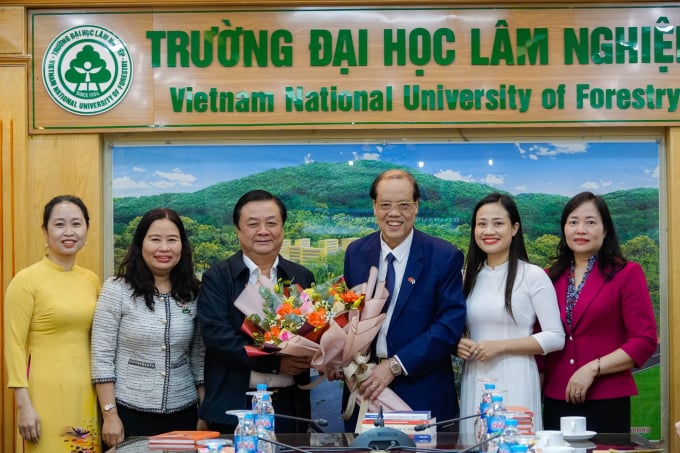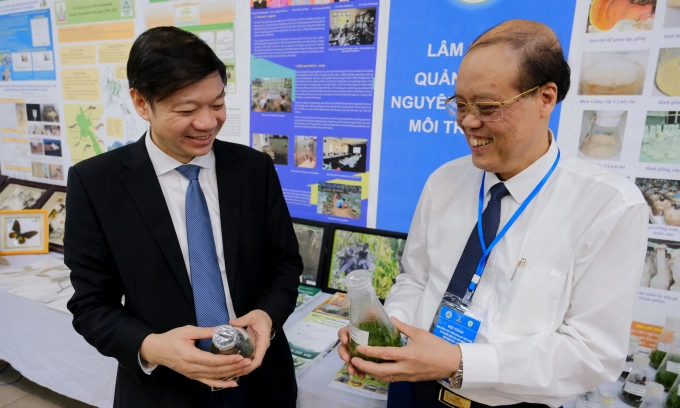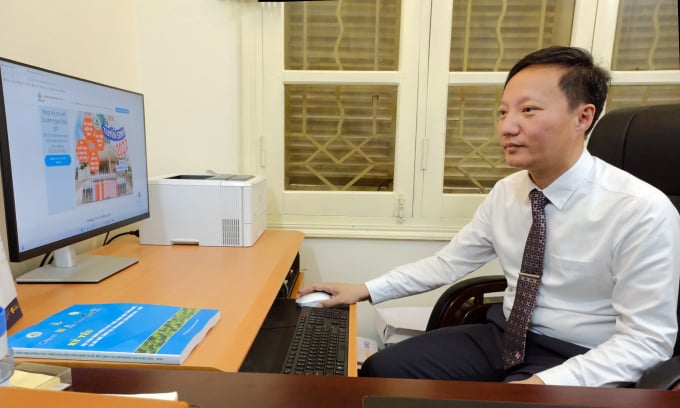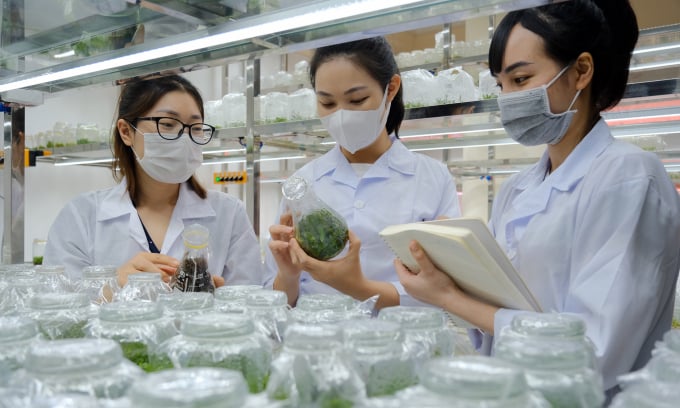June 19, 2025 | 08:10 GMT +7
June 19, 2025 | 08:10 GMT +7
Hotline: 0913.378.918
June 19, 2025 | 08:10 GMT +7
Hotline: 0913.378.918

Minister of Agriculture and Rural Development Le Minh Hoan visiting Vietnam National University of Forestry in April 2022.
Hanoi People's Committee issued Decision No. 8341/QD-UBND dated November 30, 2017 on the establishment of Forestry High School (F-School). This is a public school under the management of Vietnam National University of Forestry, developed from the Board of Ethnic Minority (established in 1992) under Vietnam National University of Forestry.
The Forestry High School officially began operation and enrolled students from the 2018 - 2019 school year. The school trains boarding high school and high school for ethnic minorities simultaneously. The school recruits 550 students each year, and the school's total number of students has remained stable at about 1,600 - 1,700 students. After three years ò operation, the school has stabilized its organizational structure; Additionally, an advanced training program has been built, with a focus on foreign language, life skills and career orientation.
"It is a memorable milestone. It helps Vietnam National University of Forestry solve enrollment problems and improves the quality of human resources", shared Assoc. Prof. Dr. Pham Minh Toai, Vice Principal of Vietnam National University of Forestry.
In addition to the main high school located in Xuan Mai town, Chuong My district, Vietnam National University of Forestry has another school located in Dong Nai. The university is planning to open another campus in Gia Lai. These are the results from the multiple career-oriented support policies by Vietnam National University of Forestry, as well as the enthusiasm of teachers in finding a solution to the "hunger for forestry resources".

Deputy Director General of the Department of Forestry Tran Quang Bao (left) discussing with the Principle of Vietnam National University of Forestry Tran Van Chu about forest tree varieties.
Opening an affiliated high school is a proposal by Vietnam National University of Forestry to "market" its curriculums, lectures, as well as the passion for knowledge to high school students. Assoc. Prof. Dr. Pham Minh Toai said that the University has signed cooperation agreements with multiple high schools in Hanoi, as well as invited students in key enrollment areas to Vietnam National University of Forestry for introduction on occupations, facilities, job opportunities upon graduation.
Another notable feature is the preferential scholarship system. Vietnam National University of Forestry has committed to providing tuition support for freshmen with an entrance score of 21 points since 2020. If students score 24 points or more, they will also be financially supported regarding dormitories and textbooks.
In terms of output, Vietnam National University of Forestry has signed a comprehensive contract with the Vietnam Forestry Corporation (Vinafor) in enrollment promotion activities, scientific research support, and job fairs. Accordingly, the majority of graduates in the fields of forestry, processing, forest resource management and environment have their outputs secured.
"Along with methodical investment in laboratories, libraries, lecture halls and auxiliary learning equipments, Vietnam National University of Forestry considers the quality of human resources to be a vital and decisive matter in the development of the university", emphasized Mr. Toai.

Assoc. Prof. Dr. Pham Minh Toai, Vice Principal of Vietnam National University of Forestry.
Vice Principal Pham Minh Toai said that it was difficult to recruit students for certain majors in the technical sector recently, especially in the fields of agriculture, forestry and fishery. These is partly due to fact that studying these industries is often considered difficult with few job opportunities in big cities.
To change the public opinion, especially that of young people, Vietnam National University of Forestry aims to link with businesses, considering them as important partners. The partlies will jointly develop training programs, regularly adjust to match practical demands.
According to the World Bank's report on human capital in 2020, Vietnam's human capital index ranks 38th out of 174 economies. Notably, Vietnam is currently ranked 15th in educational results, equivalent to countries such as the Netherlands, New Zealand, Sweden, etc. In addition, Vietnam has 4 universities ranked among the top 1,000 of the world; 11 universities among the top universities in Asia; Many majors and fields of training are ranked in the top 500 of the world.
These statistics are very encouraging. However, the development industries are not very sustainable when inspected at a fundamental level, human resources for some industries are severely lacking, especially high-quality human resources.
"Present university graduates must not only possess good knowledge and professional qualifications, but also the necessary skills to not be replaced by robots and artificial intelligence, especially skills in creativity, cooperation and critical thinking", Prof. Dr. Tran Van Chu assessed.
In Vietnam's human resource development plan for the period of 2011 to 2020, the proportion of trained human resources in the agriculture-forestry-fishery sector increases from 15.5% in 2010 to nearly 50% in 2020. But by 2020, human resources in this sector lacked 3.2 million trained workers, especially skilled and high-level technical workers.
On the comment that "well-developed human resources will create national advantages", Mr. Chu gave the example of two countries, Singapore and the US. From an underdeveloped country, Singapore rose to become a leading industrial country, while the US continuously enhanced its socio-economic position in the international arena.
"High-quality human resources have always been a vital factor, playing a particularly important role in the country's economic development. We need to act soon, act immediate to solve this bottleneck", Prof. Dr. Tran Van Chu emphasized.

Vietnam National University of Forestry students are active in scientific research activities.
Solving the human resources challenge requires time and synchronous participation from all stakeholders. According to the Principal of Vietnam National University of Forestry, there are two main problems to be resolved as quickly as possible.
Firstly, a suitable investment policy and program for agricultural high-quality human resources is necessary. This can viewed as an investment in training human resources for industries that the state has difficulty recruiting but desperately needs.
Secondly, it is necessary to propagate and emphasize with the community that, human resource development is an indispensable need of the labor market around the world.
"Universities and employers must cooperate for common development. The universities - businesses connection doesn't stop at scholarships or internship opportunities for excellent graduates, but also in many other diverse aspects. Only then will the new connection be substantive and effective", concluded Mr. Chu.
At the Vietnam National University of Forestry, educational methods are gradually being renewed, in terms of knowledge systems and training methods, to adapt to global intergration. With the students as the center, the University strengthens teaching majors that are of great interest to many students, including digital, information technology, new energy and materials, biotechnology and so on to help students master the current digital evolution.
Vietnam National University of Forestry is currently expanding its cooperation with over 100 universities, training institutions, research institutes and international organizations in many countries around the world including the US, Germany, Sweden, Switzerland, Russia, Finland, the Netherlands, China, Japan, Australia, Canada. Some International organizations such as GTZ/GIZ, JICA, FAO, UNDP, IUCN, WB, WWF, ITTO, InWent, ICRAF regularly exchange information with the university on many aspects related to human resource training.
According to statistics, the rate of graduates employment after 1 year is 98% for this university. To achieve such goal, the university organizes annual job fairs, connect students with businesses across the country.
Translated by Nguyen Hai Long
/2025/06/17/3942-2-143243_548.jpg)
(VAN) Recently, in Sweden, the Secretary of the Binh Dinh Provincial Party Committee presented the Investment Registration Certificate for the 'Polyester Fabric Recycling Complex' project to SYRE Impact-AB Company.
/2025/06/12/3721-2-202745_83.jpg)
(VAN) TH made an impression at Seoul Food 2025 with its line of natural beverages, paving the way for Vietnamese food products to enter the South Korean market.

(VAN) Soc Trang's success in rice exports stems from a strategy of developing fragrant and specialty rice cultivation areas and standardizing production toward low-emission practices.
/2025/06/11/1311-5-120811_839.jpg)
(VAN) The pig farming industry is facing the challenge of comprehensive restructuring to meet requirements for quality, safety, traceability, and market expansion both domestically and for export.

(VAN) Vietnam considers participating in ALGROALBA in order to expand agricultural production, coordinate the assessment and effective exploitation potential land.
/2025/06/05/5314-1-184727_407.jpg)
(VAN) From seemingly worthless fish scales and skin, enzymes and lactic ferments can transform by-products into peptides, opening a sustainable, effective business direction and elevating Vietnamese seafood.

(VAN) TTC AgriS and IFC signed a strategic partnership to develop a sustainable agricultural value chain, aiming to achieve the Net Zero target by 2035.